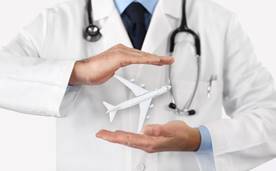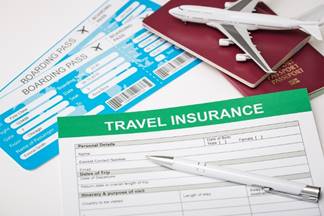Before You Travel Tips

Some airlines check for visibly sick passengers in the waiting area and during boarding. If you look like you may be sick, the airline may not let you get on the plane. Important: If you’re sick, check with your airline to see what options you have for rescheduling your flight. Each airline has its own policy about rescheduling flights because of an illness or emergency.
Here are some things to consider before you head out on your next adventure.
First, know your health status.
Work with your doctor to evaluate your health, or the health of those traveling with you, by using the guide below. In general, you should not travel by plane if you:
- Have recently had any type of surgery, especially stomach, brain, eye, or orthopedic (bone or joint) surgery. Check with your doctor to see when it is safe for you to travel.
- Have had a recent heart attack or stroke
- Are suffering from:
- Chest pain, pneumothorax, or a severe chronic respiratory disease
- Severe sinus, ear, or nose infection
- Any disease that you can easily spread to other people
- A fever of 100.4°F (38°C) or greater
- Swelling of the brain caused by bleeding, injury, or infection
- Sickle cell disease
- Uncontrolled psychotic illness
Special Considerations
- If you’re traveling with a disability, a weakened immune system, or a chronic illness, make sure you talk to your doctor and take extra steps to ensure a safe and healthy trip.
- If you’re pregnant, be sure to talk with your doctor before making any travel decisions. Pregnant women over 36 weeks may not be able to travel by plane.
- Talk to your doctor if you have blood clots, including deep vein thrombosis (DVT) or pulmonary embolism (PE). Airplane travel, especially flights longer than 4 hours, may increase the risk for DVT or PE.. Read more about minimizing blood clot risks here.
- You are at increased risk for blood clots, DVT, or PE if you:
- Have had DVT/PE in the past
- Have a family history of blood clots
- Have had recent surgery (especially abdominal or orthopedic)
- Are pregnant, are postpartum, or are taking birth control pills or hormone replacement therapy
- Are a smoker
- Are overweight (BMI ≥30 kg/m2)
- Have cancer, restricted movement, or a blood-clotting problem
- You are at increased risk for blood clots, DVT, or PE if you:
Check your destination & see a doctor before you go.

Check your destination for concerns to be aware of before you leave. Depending on where you’re going and what you’ll be doing, you may need vaccinations, medicines, and destination-specific advice before your trip.
See you doctor at least a month before you go. CDC websites provide recommendations, but CDC cannot give you specific medical advice. Recommendations for vaccines and medicines depend on many factors that are specific to each person. You should let your doctor know that you are planning a trip at least 4 weeks before departure to be sure you can get the vaccines and medications you need.
- Be sure to give your doctor the following information about your trip so they can assess your risks:
- Where you are traveling to
- When you are leaving
- The length of your trip
- What types of activities you might do
- Other personal matters such as your age, allergies, medical and vaccine history, and prior travel experience
- Follow the advice of your doctor by getting the vaccines and medicines that are recommended for you.
- Make sure that you are up to date with all of your routine vaccinations, including measles-mumps-rubella (MMR) and a seasonal flu vaccine.
- Consider any recommended travel vaccines for your destination.
Plan ahead for injuries. Consider insurance.

Know the different types of insurance. Travelers are responsible for hospital and other medical expenses incurred during their trip. Be prepared to pay out of pocket at the time you receive any medical services while abroad or if you cancel plans while traveling, even if you do have insurance.
- Trip Cancellation Insurance: Trip cancellation insurance covers your financial investment in your trip, such as flights, cruises, and/or train tickets.
- Carefully examine the policy to make sure it covers your needs, including cancellation if you or a close family member gets sick.
- Travel Health Insurance: If you need to go to a hospital or clinic overseas, you may need to pay out of pocket for any services, which could be very expensive.
- Check your health insurance plan to see if it covers potential health needs abroad.
- If your insurance doesn’t cover you while you’re traveling, consider purchasing additional insurance.
- If you plan to participate in adventure activities, such as scuba diving or hang gliding, you may need additional extreme sports insurance.
- Medical Evacuation Insurance: If you are traveling to a remote destination or to a place with limited medical capabilities or accessibility, consider buying medical evacuation insurance. This kind of insurance will cover the cost of transporting you to other parts of a country or outside the country if you are seriously ill or injured.
- It can be purchased separately or as part of your travel health insurance policy.
- It will pay for emergency transportation from a remote area to a hospital.
- Ensure that the policy provides a 24-hour physician support center for you to contact in an emergency.
Some areas are prone to certain natural disasters, such as earthquakes, hurricanes, or tsunamis. To find out if your destination is at risk for certain natural disasters, see the Country-specific Information Pages (US Department of State) in the “Special Circumstances” section.
- For information about types of natural disasters, how to prepare for one, and what to do after one happens, see CDC’s Natural Disasters and Severe Weather website.
Learn about common travel safety concerns on the US State Department’s Travel Advisories page.
- Enroll in the Smart Traveler Enrollment Program. The US Department of State provides this free service to US citizens who are traveling or living in another country. You can record information about your trip so that an American consular officer can reach you and help in an emergency.
- The Association for Safe International Road Travel (ASIRT) provides helpful information about road safety in other countries.
- Learn about local laws and the culture of your destination. Find more information here.
Pack smart.

- Pack a travel health kit.
- Pack enough medicine for your whole trip plus a little extra, just in case.
- Check with the U.S. foreign embassy of the country you will be visiting to make sure your prescription medicines are permitted at your destination. Read more about traveling abroad with prescription medicines.
Know and share your trip information.
- Make sure you and a friend or family member have copies of all of your travel documents, including your passport, health insurance documents, itinerary, and prescriptions.
- Register with the Smart Travelers Enrollment Program (https://travel.state.gov/content/travel/en/international-travel/before-you-go/step.html)
- Write down the contact information of people or services you may need to contact while abroad.
- Make arrangements to check in with someone at regular intervals during your trip.
- If there is an emergency at home, or if a family member is worried about a traveler’s welfare, they can ask the embassy or consulate for help.
- If you think you may need assistance, contact the local US embassy or consulate. They are available 24/7 with emergency assistance for US citizens.
- Dial 1-888-407-4747 if calling from the United States or Canada,
- Dial 00 1 202-501-4444 if calling from overseas, or
- Find your local US embassy, consulate, or diplomatic mission.


































No hay comentarios:
Publicar un comentario